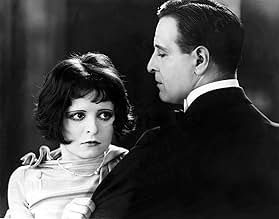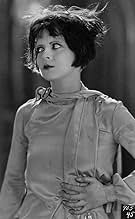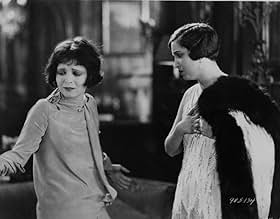A young girl becomes a "flapper", defying her parents and the community.A young girl becomes a "flapper", defying her parents and the community.A young girl becomes a "flapper", defying her parents and the community.
- Director
- Writers
- Stars
- Awards
- 2 wins total
- Director
- Writers
- All cast & crew
- Production, box office & more at IMDbPro
Featured reviews
Former stage star Alice Joyce (as Ethel "Buddy" Westcourt) stays at home while her husband and daughter enjoy a life of cruising, boozing, and romantic entanglements. When she finally decides to go out on the town, Ms. Joyce meets playboy Conway Tearle (as Gerald "Jerry" Naughton), who has been seen with Joyce's frequently tipsy daughter Clara Bow (as Catherine "Kittens" Westcourt). To protect Ms. Bow's tenuous honor, Joyce makes a date with Mr. Tearle. Her loneliness is over when Joyce unexpectedly falls in love with Tearle. He returns her love, and proposes. But, husband Norman Trevor (as Hugh "Hughie" Westcourt) has called it quits with his latest mistress, and wants his wife back...
What should Joyce do?
Her character's decision puts "Dancing Mothers" ahead of its time. This was a great role for Joyce, who became one of film's first huge movie actresses in 1912 (and, she was wildly popular throughout the decade). Her restrained style was often heralded by critics, and Joyce might have been considered for a "Best Actress" Oscar, had they started a couple of years earlier. Joyce's confrontation with Bow, and her final scene, are most memorable. It helped that Joyce was directed by Herbert Brenon, a favorite director who used her well. This was a top "Paramount" production, with veterans Dorothy Cumming and Eleanor Lawson, plus young Donald Keith rounding out what could then be called an "All-Star" cast.
******** Dancing Mothers (3/1/26) Herbert Brenon ~ Alice Joyce, Conway Tearle, Clara Bow, Donald Keith
What should Joyce do?
Her character's decision puts "Dancing Mothers" ahead of its time. This was a great role for Joyce, who became one of film's first huge movie actresses in 1912 (and, she was wildly popular throughout the decade). Her restrained style was often heralded by critics, and Joyce might have been considered for a "Best Actress" Oscar, had they started a couple of years earlier. Joyce's confrontation with Bow, and her final scene, are most memorable. It helped that Joyce was directed by Herbert Brenon, a favorite director who used her well. This was a top "Paramount" production, with veterans Dorothy Cumming and Eleanor Lawson, plus young Donald Keith rounding out what could then be called an "All-Star" cast.
******** Dancing Mothers (3/1/26) Herbert Brenon ~ Alice Joyce, Conway Tearle, Clara Bow, Donald Keith
Dancing Mothers is a rather dull film except for the vivacious Clara Bow playing "Kittens." Also of interest are the truly ugly sets (check out the hideous pirate-themed nightclub) and the great women's clothes. Clara Bow wears some really bizarre outfits as the jazz baby who sets her sights on Conway Tearle, who plays a "famed lady killer." Tearle is old and dull but was a star in 1926. Alice Joyce is the nominal star. She was billed as "the madonna of the screen," but shows little vitality here as the mother who decides to "live." Dorothy Cumming (whose named is misspelled as "Cummings" in the credits) is good as Mazzy, and Leila Hyams, Donald Keith, Norm Trevor, and Eleanor Lawson round out the supporting cast. Worth seeing for the always-good Clara Bow and for the shocking ending. The whole film seemingly leads up to the conventional ending, but then takes a different route. Dancing Mothers was a big hit in 1926 and helped make Bow one of the biggest stars of the last 20s.
clara bow plays "kittens westcourt," a spoiled girl of wealthy parents. she spends her evenings dancing and partying all night long at clubs, which her father also attends. her mother stays at home wondering why her family is so selfish, and neglectful towards her. one day a friend tells mom to start living it up. she takes this advice and is soon off to the dance clubs herself. kittens and mother then proceed to compete for the same man's affections. above average clara bow film. she is not the lead actress in the film, but she has lots of screen time. clara is funny, full of energy, and just wonderful.
Dancing Mothers is unique in two ways...its ending and showing how women have minds and opinions of their own. While most Hollywood Melodramas of this period had happy, "Pollyanna-ish" endings...Dancing Mothers strays in a most realistic and refreshing way. The Mother (Alice Joyce), tired of being taken for granted, goes out on her own and leaves her selfish daughter (Clara Bow) and husband (Norman Trevor) behind. an ending that todays audiences do not have a hard time swallowing, but audiences of the 1920's expected everything to be tied up in pretty Hollywood ribbons and all made good. And bravo for those who chose to have a woman hold her own and stand up for herself and not give in to what societal norms would dictate. Strong women were not too very typical in the silent era.
I fell in love with this play when I read it in the Burns Mantle Best Play series - it was certainly the best of its year and perhaps of the decade in both its characterizations and structure and in the morality tale that was dead on for its time. This was the sort of thing that would have been remade as an early talkie if the stock market crash hadn't changed that flapper world forever.
The plot is laid out here in other reviews. Alice Joyce's leading performance and Clara Bow's supporting one are both of award calibre as is the screenplay adaptation. It is competently directed and photographed, nothing special in the technical categories. What stands out is the writing and the acting of the women. Startling and special. Very worth seeking out.
The plot is laid out here in other reviews. Alice Joyce's leading performance and Clara Bow's supporting one are both of award calibre as is the screenplay adaptation. It is competently directed and photographed, nothing special in the technical categories. What stands out is the writing and the acting of the women. Startling and special. Very worth seeking out.
Did you know
- TriviaPrints of this film--at 65 minutes--are held by the Library of Congress and the UCLA Film and Television Archives.
- Quotes
Mrs. Mazzarene: I warn you--you're playing with fire.
Ethel Westcourt: I'm playing with life!
- ConnectionsFeatured in Hollywood (1980)
Details
- Runtime
- 1h 6m(66 min)
- Sound mix
- Aspect ratio
- 1.33 : 1
Contribute to this page
Suggest an edit or add missing content




























